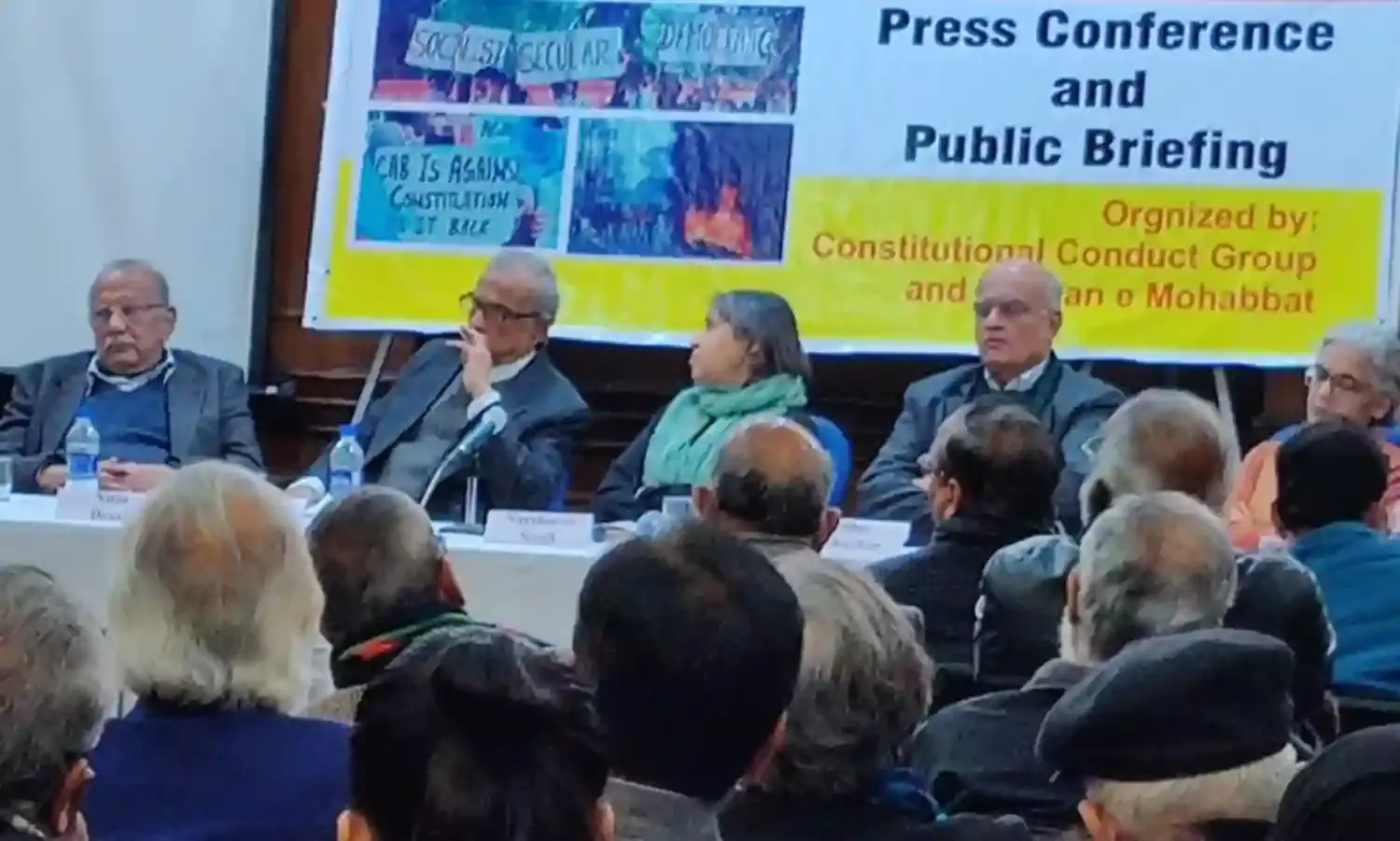'Nationally Divisive': Senior Bureaucrats, Scholars Speak Against the 'Holy Trinity' of CAA NRC NPR
'Nationally Divisive': Senior Bureaucrats, Scholars Speak Against the 'Holy Trinity' of CAA NRC NPR

NEW DELHI: “Global opinion on India has shifted” in the wake of the Citizenship Amendment Act, stated former foreign secretary Shivshankar Menon,
Senior bureaucrats and scholars came together today to highlight the “unconstitutional” and “nationally divisive” nature of the citizenship amendments in a public briefing organised by the Constitutional Conduct Group and Karwan e Mohabbat. The speakers including Faizan Mustafa, Deb Mukharji, Nitin Desai, Zoya Hasan, Gautam Bhatia, Niraja Jayal, Navsharan Singh, Mohsin Alam Bhat and Harsh Mander.
Menon, who served as National Security Advisor under the Prime Ministership of Manmohan Singh, stated, “There has been no international support, except diasporic and extreme right voices” in favour of the CAA.
The King of Norway denounced the Act and the UN High Commissioner for Human Rights termed the Act as “fundamentally discriminatory”, while simultaneously expressing concern for the situation in Kashmir. “Several international publishers have come out against CAA NRC,” he added.
Menon further stated, “We've hyphenated our relationship with Pakistan. This inhibits investment because no trust. Seven countries have issued travel warnings on us. Sectarian divisive party political goals. More than half our GDP is external sector. Going it alone is not an option. We seem to be intent on doing just that.”
Nitin Desai, former Under-Secretary-General for Economic and Social Affairs of the United Nations explained, “A citizen is part of a political concept. Citizenship will always be political. The idea of universality of citizenship is a central part of the Constitution.”
“Citizenship gave you a sense of equality, even if in every other respect you're not. If you're a resident of India, you're a citizen. End of story,” Desai stated. He further added that what India is doing today is providing “amnesty by religion”.
“Anybody not a Muslim, gets amnesty. If you are, then not. This is reflective of Hitler's Germany,” Desai said while addressing the crowd. “In political terms this is a huge departure from the Constitution,” he added.
Deb Mukharji, former Indian ambassador said “Words of Home Minister and PM differ. We were urban naxals. The new NPR of 2020 is not the preceding one. This has a connection to our parents. This is not about refugees. Or Hindus and Muslims. This is to create laws that can be held against the Muslims of this country.”
Calling CAA, NRC and NPR the “holy trinity”, Niraja Jayal, writer and professor at Centre for the Study of Law and Governance, Jawaharlal Nehru University, said that the three “carve a path to statelessness.”
Delhi-based lawyer, Gautam Bhatia stated that the citizenship law, based on “origin and religion”, “discriminates against people on the basis of factors that people can't control themselves.” “This is not a case of imperfect drafting. It's clear separation,” he said, adding that the CAA violated Article 14 of the Constitution by favouring certain communities over others.
The recently passed CAA provides citizenship to Sikhs, Parsis, Christians, Buddhists, Jains and Hindus from Pakistan, Bangladesh and Afghanistan, leaving out Muslims. According to Bhatia, citizenship, grounded on the basis of religion, undermines secularism as any religion, apart from the “state religion” in a country can be deemed as a “persecuted religion”.
Zoya Hasan, political scientist and academician stated, “This is not a fight for Muslims. It's a fight for democracy and the Constitution.” She further highlighted the issue of including only Pakistan, Afghanistan and Bangladesh in the Act, stating that there are many persecuted religions in neighbouring countries of Sri Lanka, Nepal, Bhutan and Myanmar as well.
“The intention is clearly to not only favour some, but demonise others. This act exclusively recognises Muslims as oppressors because of the choice of countries. Using religion is patently unjust,” she said.
Mohsin Alam Bhat, Assistant Professor and Executive-Director of the Center for Public Interest Law at Jindal Global Law School stated, “NPR is not census. Doesn't happen under Census Act. It comes under citizenship process. In 2003 rules, Government of India decided there's a particular way you can create NRC, by first creating a population register.”
Bhat further added that once NPR is prepared, low level officials will be charged with the responsibility of determining “doubtful citizens”. “Something like citizenship can't be left to the government. It should be left to the judiciary. This is an executive decision to ask anybody to give their documents,” Bhat stated.
Navsharan Singh explained the need for a “more humanitarian policy”, stating, “There are much smaller developing countries which are shouldering the responsibility of storing refugees so India can't claim the argument that it doesn't have the capacity. This law is not desired to respect the rights of people on the move. It's not to express solidarity with those forced to flee. It's not even to include, but to exclude. To disenfranchise. India's approach is becoming xenophobic.”
Harsh Mander, Bureaucrat turned activist, said, “For a majority country to become majoritarian, Supreme Court has a very crucial role. But it's repeatedly failed us—Kashmir, Ayodhya, Jamia, AMU.” Mander, in response to a reporter’s question, said that one cannot choose to provide information for the census but not for the NPR. He called for a boycott of the census and NPR, stating, “We can't rely on the Parliament or judiciary. So this is an urgent need.”


